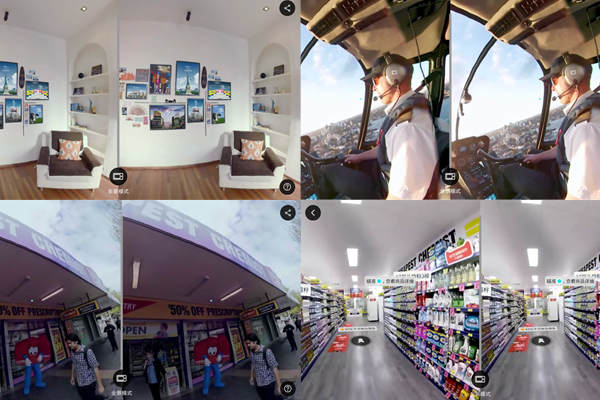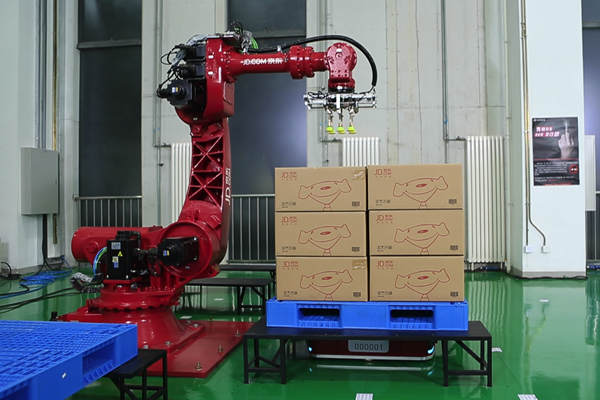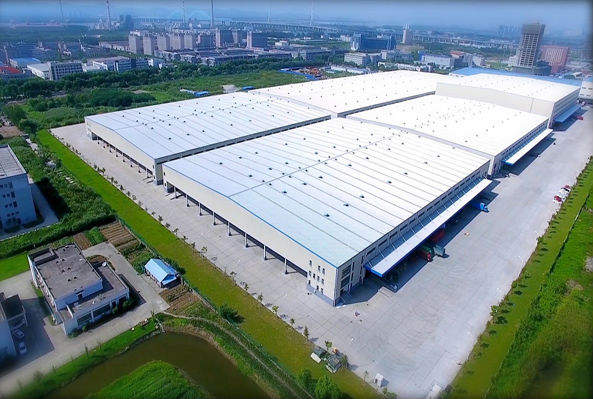

The day of November 11, nicknamed Singles Day in China, has not yet arrived, but domestic e-commerce conglomerates have already geared up for the battle of the 11.11 shopping festival, the country's biggest annual online shopping spree since it was created on November 11, 2009.
Besides traditional marketing promotions like coupon distribution and special sales, this year e-commerce giants are adopting cutting-edge technology to create an eye-opening online shopping experience for consumers.

Taobao: Virtual reality
Screenshots show the VR shopping mode in Buy+ in Beijing, on November 7, 2016. (Photo source: Chinadaily.com.cn)
Alibaba Group Holding Ltd, the pioneer and leader in e-commerce who first created the festival, officially launched a virtual reality (VR) online shopping channel called Buy+ in the mobile app of its e-commerce site Taobao on Nov 1.
Buy+, offering panorama mode and VR shopping mode, can resemble an offline shopping experience. In VR mode, the user wearing VR goggles, that do not have to be as high-end as HTC Vive or Oculus Rift, can go shopping overseas, see the view of a local street, enter a store, view and select a product by focusing their vision on it and purchase the product by focusing on a certain area for around three seconds.
Compared to the first version of Buy+, which debuted at Taobao's "Creation Festival" in July, this version is much more convenient and requires less equipment for users.

The Tmall cat mascot is seen on the screen of the Tmall app in Beijing, November 7, 2016. [Photo by Zhu Lingqing/chinadaily.com.cn]
Tmall: Augmented reality
The Tmall cat mascot is seen on the screen of the Tmall app in Beijing, November 7, 2016.(Photo source: Chinadaily.com.cn)
Alibaba's e-commerce site Tmall released a Pokemon Go-like location-based augmented reality (AR) mobile game in its app on October 27. Consumers can chase the Tmall cat mascot across online shops and brick and mortar stores, such as Intime shopping malls, Shanghai Disneyland, KFC and Starbucks, to win special promotions or prizes.

JD.com: Drones, driverless cars and unmanned warehouses
A conveying robot works in JD.com's fully-automated warehouse. (Photo source: Chinadaily.com.cn)
JD.com Inc, the second-largest domestic online retailer by market share, is focusing on intelligent logistics. The company has developed drones, driverless cars and fully-automated warehouses to automate its logistics flow, according to a report by Xinhua.
In a fully-automated warehouse, goods can be sorted and delivered by robots that can make independent judgments and act according to different application scenarios and types of goods.
JD.com's self-developed drones are pictured in Suqian city of East China's Jiangsu province.(Photo source: Chinadaily.com.cn)
While the company's self-developed drones have already been used in rural areas for "last mile" distributions, the driverless cars that can deliver goods to designated pickup spots will have their first trial operation in areas near the company's headquarters in Beijing this November, according to a report by lanjingtmt.com.

Suning: Intelligent logistics
View of ‘Suning cloud warehouse'. (Photo source: Chinadaily.com.cn)
Retail giant Suning Commerce Group Co will induct its intelligent warehouse ‘Suning cloud warehouse' during the shopping festival.
The whole-process mechanized, automated and intelligent warehouse can process 1.81 million packages daily and deliver goods in the shortest time of 30 minutes.

 Who Will Fit The Chinese Roles In Game Of Thrones?
Who Will Fit The Chinese Roles In Game Of Thrones? China's Hubei Shennongjia added to World Heritage List
China's Hubei Shennongjia added to World Heritage List Cute Dog At Fruit Stand Becomes Latest Internet Sensation
Cute Dog At Fruit Stand Becomes Latest Internet Sensation Top 10 livable Chinese cities
Top 10 livable Chinese cities The last primitive tribe in China
The last primitive tribe in China China's first intelligent security robot debuts in Chongqing
China's first intelligent security robot debuts in Chongqing A Total of 3,552 Subscribers Vanish In Two Days; YouTube Closes All Doors to Users’ Inquiries
A Total of 3,552 Subscribers Vanish In Two Days; YouTube Closes All Doors to Users’ Inquiries Out of this world! Futuristic UFO-shaped yacht has its own garden and a stunning underwater viewing deck
Out of this world! Futuristic UFO-shaped yacht has its own garden and a stunning underwater viewing deck An old tea house in Chengdu
An old tea house in Chengdu Furious Customer Crushes All the Buns from Vendor Just Because He Was Given the Wrong Flavor
Furious Customer Crushes All the Buns from Vendor Just Because He Was Given the Wrong Flavor